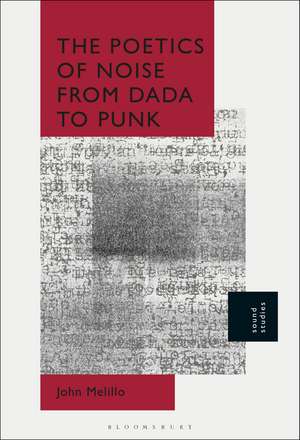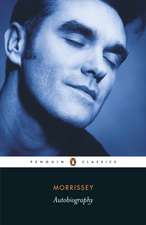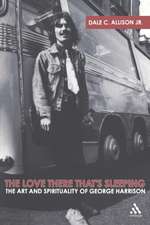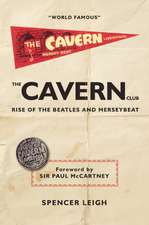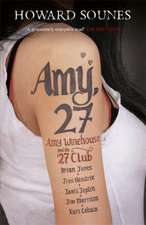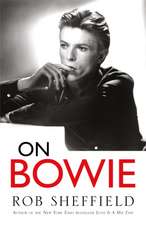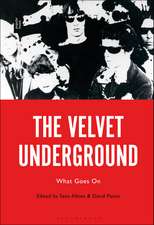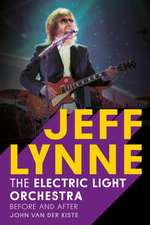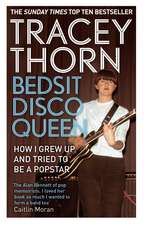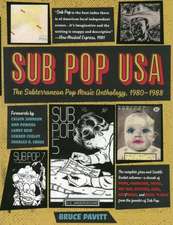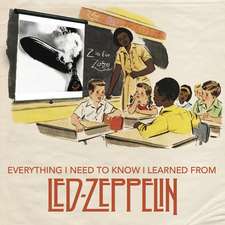The Poetics of Noise from Dada to Punk
Autor John Melilloen Limba Engleză Paperback – 23 mar 2022
| Toate formatele și edițiile | Preț | Express |
|---|---|---|
| Paperback (1) | 196.71 lei 6-8 săpt. | |
| Bloomsbury Publishing – 23 mar 2022 | 196.71 lei 6-8 săpt. | |
| Hardback (1) | 567.90 lei 6-8 săpt. | |
| Bloomsbury Publishing – 2 sep 2020 | 567.90 lei 6-8 săpt. |
Preț: 196.71 lei
Preț vechi: 257.29 lei
-24% Nou
Puncte Express: 295
Preț estimativ în valută:
37.64€ • 39.40$ • 31.33£
37.64€ • 39.40$ • 31.33£
Carte tipărită la comandă
Livrare economică 31 martie-14 aprilie
Preluare comenzi: 021 569.72.76
Specificații
ISBN-13: 9781501373725
ISBN-10: 1501373722
Pagini: 208
Dimensiuni: 152 x 229 x 15 mm
Greutate: 0.29 kg
Editura: Bloomsbury Publishing
Colecția Bloomsbury Academic
Locul publicării:New York, United States
ISBN-10: 1501373722
Pagini: 208
Dimensiuni: 152 x 229 x 15 mm
Greutate: 0.29 kg
Editura: Bloomsbury Publishing
Colecția Bloomsbury Academic
Locul publicării:New York, United States
Caracteristici
Discusses the way in which the verbal art of poetry fits into studies of sound, noise, and contemporary music.
Notă biografică
John Melillo is Associate Professor of English at the University of Arizona, USA. He researches and teaches modern and contemporary literature, poetry, and sound studies. Melillo also makes noise/music under the name Algae & Tentacles.
Cuprins
Introduction 1. (Re)Versing Noise: Ear-Witness, Metrical Form, and the Western Front 2. Dada Bruitism and the Body3. The Persistence of "That Da-Da Strain": The Modernist Travels of "Da"4. Projective Versification, Sound Recording, and Technologizing the Body5. Noise and the City: Writing and Punk Performance, 1965-19806. Noise Music, Noise History: Articulations of Sound Forms in Time Notes Bibliography
Recenzii
The book is by no means a philosophy of sound, noise or sound/noise, but rather an exegesis and hermeneutics of sound-making work (which is what Melillo considers poetry to be) and the important noise(s) thus revealed. It also contains a dose of exegesis's opposite, eisegesis, a drawing-in rather than out, of deeply subjective, if zeitgeisty, opinion from certain areas of academia ... This reviewer will think differently now of some of the sounds he and others make. The rest is/not noise.
Cueing up a major new track within sound studies, John Melillo declares that noise is a crucial figure in 20th-century poetry and music--as well as an interruption to figuration. Through resonant soundings of war poetry, Dada, modernism's thunder, and later experiments, this coup of close-listening provides ear-witness to the period's disturbing 'undersound.'
In a study both wide-ranging and meticulous, John Melillo demonstrates that poetry's turn away from the communicative function does not merely embrace noise over message, but rather refigures the entire relationship between such concepts. In the process, he rearticulates the history of modern poetry and the very status of the reader; such reconfigured relationships, as he argues, are the very hallmarks of the power of noise itself. This is thus a wonderfully noisy book.
Noise, in John Melillo's account, is a defining feature of radical modernist and postwar poetics. But not noise as entropy. This book explores noise as expressive of what's beyond mundane sense, the noise heard by Owen and Sassoon on the killing field of World War 1. Staged at the Cabaret Voltaire, with Tristan Tzara, Hugo Ball, Amiri Baraka, John Cage, Langston Hughes, Olson, Tracie Morris, Richard Hell and Susan Howe as guides, Melillo let's noise stay noisy.
Cueing up a major new track within sound studies, John Melillo declares that noise is a crucial figure in 20th-century poetry and music--as well as an interruption to figuration. Through resonant soundings of war poetry, Dada, modernism's thunder, and later experiments, this coup of close-listening provides ear-witness to the period's disturbing 'undersound.'
In a study both wide-ranging and meticulous, John Melillo demonstrates that poetry's turn away from the communicative function does not merely embrace noise over message, but rather refigures the entire relationship between such concepts. In the process, he rearticulates the history of modern poetry and the very status of the reader; such reconfigured relationships, as he argues, are the very hallmarks of the power of noise itself. This is thus a wonderfully noisy book.
Noise, in John Melillo's account, is a defining feature of radical modernist and postwar poetics. But not noise as entropy. This book explores noise as expressive of what's beyond mundane sense, the noise heard by Owen and Sassoon on the killing field of World War 1. Staged at the Cabaret Voltaire, with Tristan Tzara, Hugo Ball, Amiri Baraka, John Cage, Langston Hughes, Olson, Tracie Morris, Richard Hell and Susan Howe as guides, Melillo let's noise stay noisy.
